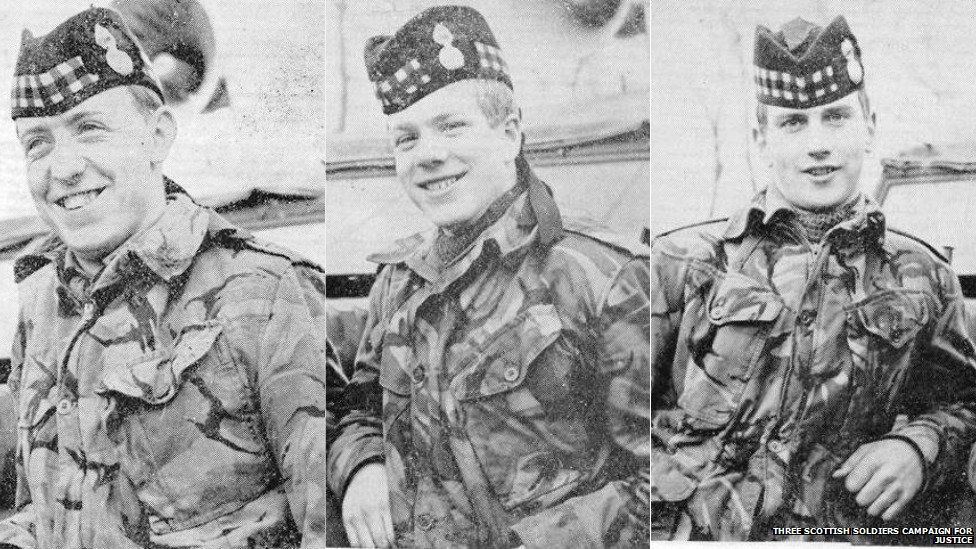Para turned IRA man Paddy O'Kane 'central to murders'
- Published

A former member of the Parachute Regiment was centrally involved in the killings of three off-duty soldiers almost 50 years ago, a BBC Spotlight investigation has established.
The Scottish soldiers were John McCaig, 17; his brother, Joseph, 18, and Dougald McCaughey, 23.
They were found shot dead in Ligoniel, north Belfast, on 10 March 1971.
The Royal Highland Fusiliers had been drinking in a city centre pub when they were lured to their deaths by the IRA.
The Spotlight investigation reveals that Paddy O'Kane, who had served seven years in the Parachute Regiment, shared a drink with the three Scots before taking them away to their deaths.
Members of O'Kane's family and a former member of the IRA confirmed to Spotlight that O'Kane said he was involved in the killings.
O'Kane, from north Belfast, joined the Parachute Regiment in 1957 and served in Cyprus and Jordan.
He was a member of the boxing team for 2 Para. When he left the Army in 1964, his duty was officially recorded as "very good".
He is believed to have joined the Provisional IRA in 1969.
Police identified him as a prime suspect almost immediately after the killings.
He was seen drinking with the soldiers in a city centre pub by a work colleague.
But O'Kane evaded arrest and went on the run in the Republic of Ireland where he remained very active in the IRA for at least another five years.
Former IRA intelligence chief Kieran Conway knew O'Kane. He told Spotlight that O'Kane spoke openly about his role in the killings.
Conway described the former Para as "a psychopath".
"I believe any man that could execute three young Scottish soldiers in that manner must have been a psychopath," he said.
Separately, multiple sources confirmed to Spotlight that Paddy O'Kane was also a lead suspect for the Kingsmills massacre of January 1976, when 10 Protestant workmen were ordered off a minibus and shot dead by the IRA.
O'Kane was listed as wanted for questioning about the Kingsmills killings for many years afterwards.
He was first refused an "On-the-Run" (OTR) letter in 2003, but in 2007 an OTR letter was approved, giving him confirmation that he was not wanted by any police force in the UK.
O'Kane died two years later, in Shannon, County Clare, where he had lived since 1976.
The bodies of the soldiers were discovered by a teenage girl.
Three years ago, Brenda Kielty made her only recorded interview about that evening.
"They were just shot and dumped on top of each other. I didn't know whether it was three Protestants or three Catholics, but I never dreamt it was three soldiers," she said.
"There was nothing to indicate that it was three soldiers."
Ms Kielty, who died shortly after the interview, was then 14 years old, a little younger than the youngest of the victims, John McCaig.
"The wee boy had loads of freckles on his face. I actually put my hand on the wee boy's face and he was warm. He definitely wasn't cold like, he was warm," she said.
The Spotlight investigation retraces the soldiers' last day.
It scrutinises a longstanding rumour that women were used to lure the soldiers to their death in what was known as a "honey trap".
It identifies three other men whom the police also suspected of involvement in the killings.
One of those men told Spotlight that he "vehemently denies any involvement".
As more emerges about the killings, there have been calls for a fresh inquest and a new investigation but police said that the clearest evidence has always been against O'Kane, who is now dead.
Spotlight, The Killings of the Three Scottish Soldiers, is on Tuesday at 22:35 GMT on BBC 1 Northern Ireland.
- Published16 August 2018
- Published23 May 2016
- Published24 March 2015